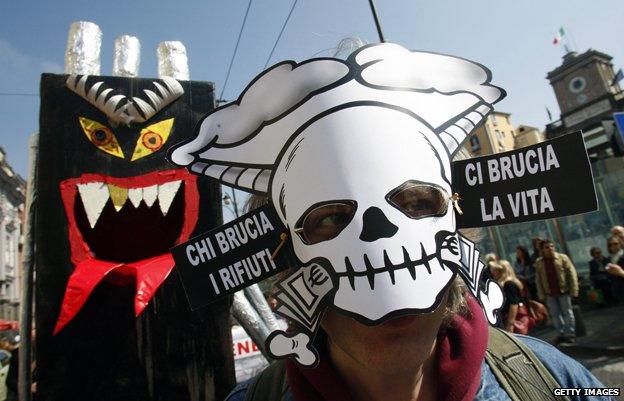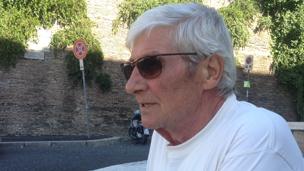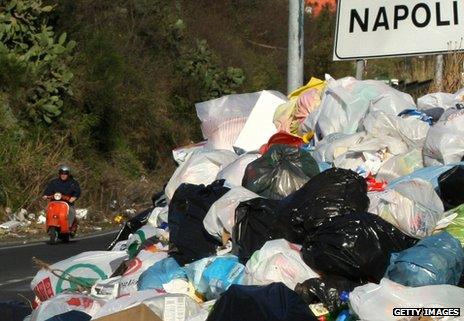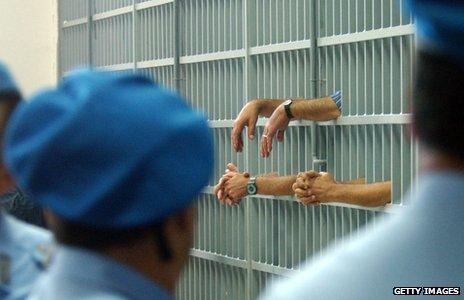The toxic reason a mafia boss became a police informant
- Published

Protesting against the long-running rubbish crisis in Naples with placards reading "Burn waste, burn life"
The Italian Senate is investigating a cluster of cancers near Naples which may have been caused by the mafia's dumping of toxic waste. It's a question that has long been on the conscience of one former mafia boss, who says it was not the violence but pollution that made him turn police informer.
Two decades ago doctors noticed that the incidence of cancer in towns around Naples was on the rise. Since then, the number of tumours found in women has risen by 40%, and those in men by 47%.
As senators investigate a possible link to the mafia - which secured lucrative contracts to dispose of waste, then dumped much of it illegally - one ex-mafia boss, Carmine Schiavone, looks on with particular interest.
He was once at the very heart of the criminal network that sowed the land with poison. He knows how much damage the mafiosi have done.
Schiavone was a major figure in one of Italy's most formidable underworld clans, the Casalesi, part of the mafia network around Naples known as the Camorra. For a time he directed the Casalesi clan's rampant criminality and extreme violence, but later he set out to try to destroy it.

Carmine Schiavone testified against fellow mafia men in the Spartacus Maxi trial
He became what's called a mafia pentito - "a penitent one", siding with the police, and testifying for the state against his fellow mob bosses.
Now, more than two decades on, he's begun talking openly about that dangerous decision and his extraordinary life.
It began 70 years ago promisingly enough. Born into a well-off family, Schiavone remembers a happy childhood in Casal di Principe, the town from which the Casalesi clan takes its name. He went to a school run by nuns, and did well enough in his education to study to be an accountant.
But what he describes as the "craziness of youth" drew him towards the criminal world. He had a girlfriend who was the daughter of a Camorra boss, and by the age of 19 he was carrying a gun and getting into serious trouble.
"I was going to play football, and then this policeman stopped me and I accidentally shot him," he says.
Then there was a spell in jail. An environment, he says, where a slap in the face could provoke a murder, or a feud between families.
"It was a society that reasoned in a different way from others. And I grew up in that environment. In jail there were old mafiosi and criminals who couldn't write, so I would write letters for them. I was a young man protected by them."
His decision to become a part of their world he now acknowledges was a big mistake.
"I should have left. Gone abroad, or even to northern Italy," he says.
Instead he immersed himself in a life of crime.
Through the 1970s and 80s the Casalesi clan would get involved in a great range of business activity.
The gangsters demanded fees and protection money from legitimate businessmen, and rigged contracts in areas like construction and waste disposal. Eventually they had large parts of the local economy by the throat, exerting control partly by manipulating politicians and intimidating judges.

Uncollected rubbish in 2008, as mafia-controlled landfills reached capacity
Schiavone himself became a member of the Christian Democratic party, which dominated the Italian parliament for decades before it was dissolved in the mid-90s.
"We started to get our representatives elected in Rome. We needed political power. Do you know how many votes the clans can provide? They can make a huge difference."
But Schiavone insists that the Casalesi conducted itself differently from the Sicilian Mafia.
"They killed the judges - we didn't. We didn't kill politicians. We just made sure that they didn't get elected. And we would force judges to move away - send them anonymous letters, or ruin their reputation in the local press with stories about their lovers, and so on."
Meanwhile, Schiavone developed his mafia business empire. He hired and fired workers, and built roads and carried out other construction projects.
A lot of money was made. Some was used to pay more bribes. But much was reinvested in places such as Brazil, the Dominican Republic, Romania and even Britain.
Schiavone claims that when his life of crime eventually ended, the Italian state confiscated more than a billion euros from his family.
But with the Casalesi's growing power and wealth came murderous internal divisions, feuds and gang wars.
"We wouldn't kill innocent people - at least while I was the one running things," Schiavone insists. "We did kill rivals. Those who we killed were not saints. They were people who wanted to kill us."
He is vague about how many murders he might have ordered.
"Fifty-two... 53? I killed seven, eight, 10, 20... I don't remember. My cousin handled the armed wing, I did the business side. And every once in a while we'd say, 'One day we'll pay for this.'"
Schiavone seems haunted by one particular murder - the strangling of the nephew of another boss, a man in his mid-20s who he had known well.
"He was supposed to take his uncle's place. And some people weren't happy with that, so he was killed... I had brought that boy up."
And Schiavone talks of another hit in which a bystander died.
"They went to kill one person, and sitting next to him there was a totally innocent person. It was a rainy night. They [the killers] saw two people, and they shot. And they were both killed. Still today I have nightmares. Still today."
But it seems that it was not the killing, in the end, that made him sick of his life of crime. What made him a pentito, he says, was his fear about the impact the Casalesi's illegal dumping of waste was having on the land.
Some may find it hard to believe that this this ruthless Camorra boss was ready to give up all his wealth and power, break the mafia code of silence, the omerta, and betray his clan purely on account of his worries about the environment.
But Schiavone insists that this is true.
"I did it when I knew that people were doomed to die from cancer. They had injected all this land - millions of cubic metres - with toxic substances. A scary cocktail."
And so he became the star witness at what was known as the Spartacus Maxi trial, named in honour of the Spartacus who led his fellow slaves in an uprising in the days of ancient Rome. The trial was portrayed as an uprising by the forces of order and decency - an attempt to overthrow the Casalesi bosses who were subjecting their region to a form of servitude.

Held in a high security jail in Naples, it went on for 10 years, hearing testimony from some 500 witnesses. But as the trial unfolded, the mafiosi struck at those who were bringing them down. Five people connected with the case were murdered.
On one occasion when Schiavone needed treatment in hospital, nurses told him they had been offered huge amounts of money to find a way to kill him. He maintains there was an attempt to poison him.
But when the trial finally ended, 16 Camorra bosses were given life sentences - a combined total of 700 years in prison.
The most notorious of the bosses was Schiavone's cousin, Francesco "Sandokan" Schiavone.
"I created him, and I destroyed him," says the pentito.
The Casalesi had been dealt a devastating blow. But they were not entirely defeated, and they remain a very substantial criminal menace today.
Since the trial, Carmine Schiavone and members of his immediate family live under police protection. He has had to move house 10 times for security reasons.
Five years after the end of the trial, he is deeply disappointed by the response of the state to his decision to testify.
In his view, there was not a wide enough effort to uproot the Casalesi. The authorities hunted for those who pulled triggers, he says, but not those who supplied weapons and covered up the clan's activities.
But most of all, Schiavone is disappointed that the environmental problem created by the mafiosi was not cleaned up.
He thought the toxic waste would be safely disposed of, and the land decontaminated. That has not happened.
And we may find out just how far from normal things are in the countryside north of Naples when that Senate committee completes its inquiry into the possible link between the dumping of waste and the rise in cancer rates.
Follow @BBCNewsMagazine, external on Twitter and on Facebook, external